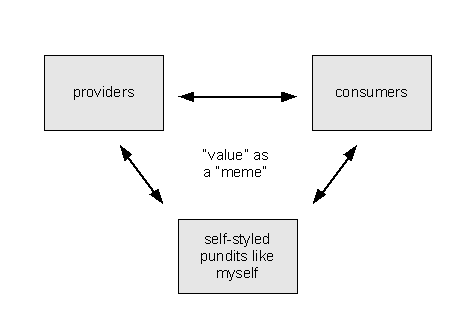After Web 2.0? Web 2.0 2.0
The next step for the web.
The original Web 2.0 conference was held in October of 2004, and now that we’ve reached the second half of the decade, Web 2.0 already seems so… turn-of-the-century. A group of bold visionaries is already creating a whole new Web 2.0 that I like to call Web 2.0 2.0.
Like anyone hyping a hot new technology trend, I won’t define what I’m talking about, but instead show an arbitrary yet evocative list:
Web 2.0 Web 2.0 2.0
Wikipedia Uncyclopedia overuse of trendy music terms (remix, mashup) overuse of French cinematic terms (mise-en-scène, montage, vérité) foo camp, bar camp, long tail camp on camp iClock human clock Google Gizoogle platforms as frameworks frameworks as platforms real weblogs by unknown people fake weblogs about famous people craigslist khraigslist RSS feeds of content other than blogs and news articles Atom 1.0 feeds of content other than blogs and news articles hot new Google apps rumors about Google apps that don’t exist yet folksonomies Fahrvergnügen flickr, del.icio.us tagtagger, supr.c.ilio.us Creative Commons Licensing uncreative uncommons licensing
These last two are instructive. While del.ici.ous lets people create tags about web sites and flickr lets people create tags about pictures, the mise-en-scène of supr.c.ilio.us takes it to the next level, letting people create tags about social bookmarking sites. Tagging about tagging! Very Web 2.0 2.0. And, they’ve even come up with a new licensing scheme for it: uncreative uncommons. Free as in “association!”
If Web 2.0 was both meaningless and meaningful, Web 2.0 2.0 is even more meaningless—and even more meaningful. Web 2.0 2.0 practitioners aren’t tied to the old, 2004 models of community building, perpetual betas, and XMLHttpRequest calls. They’re thinking big by thinking small, by thinking big, and we’re seeing a qualitative difference in the role of the web in our lives. It’s no longer about “us,” but about “we,” and you can’t spell “web” without “we.” (You also can’t spell “asshole” without “aol,” but that’s a separate topic.)
Web 2.0 2.0 technologies like HWAJAX (Hand Waving + Asynchronous JavaScript + XML) are transforming the value exchange paradigm as we know it. While Web 2.0 (or, as the French call it, “web deux point eaux”) was about two-way communication between providers and consumers, Web 2.0 2.0 is about three-way communication, between providers, consumers, and self-styled pundits like myself, all centered around “value” as a “meme.” A diagram will make it easier to understand:

If you haven’t seen any examples of what I’m talking about, then I guess you just don’t read the right blogs, do you? Web 2.0 2.0 is truly the fulfillment of Tim Berners Lee’s original vision of the World Wide Web: “Often it was just easier to go and ask people when they were having coffee.” Or, put another way, the Web is the network is the computer.
William Gibson, who is some kind of prophet or something, once said “The future is here. It’s just not evenly distributed yet.” This is apparently a very cool thing to quote in vague, utopian blog postings, probably because the word “distributed” alludes to distributed computing, which is much hipper than centralized systems. Arthur C. Clark wrote that “Any sufficiently advanced technology is indistinguishable from magic,” which proves my point just about as well. The use of at least one of these quotes is mandatory in any essay that’s going for a technology visionary effect, and I have both of them, so I have a particularly clear grasp of where the web is going.
But in the words of filmmaker and Web 2.0 2.0 patron saint Marty DiBergi, enough of my yakkin’ : get out there and start creating Web 2.0 2.0 applications! There’s money to be made—and this time we’ll do it right, without creating the mess that Bubble 2.0 became.
2 Comments
By Eran on January 3, 2006 4:17 PM
Hey Bob,
Good article. I really think this web 2.0 2.0 thing will catch on. Not sure about that whole french thing though but that’s mostly because i’ve no clue what all them words mean.
PS. I think you meant Uncreative _Un_commons.
Eran.
By Bob on January 3, 2006 4:36 PM
Thanks Eran, I fixed it.



Share this post